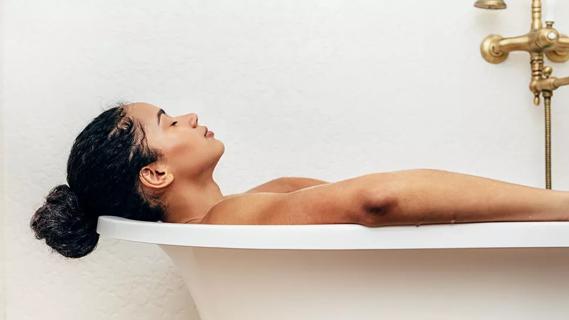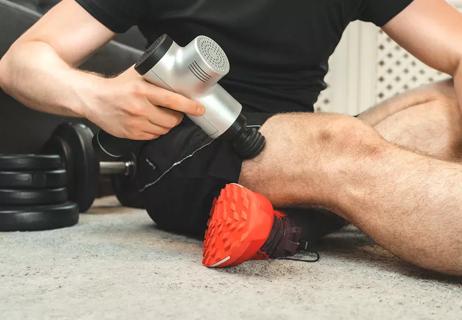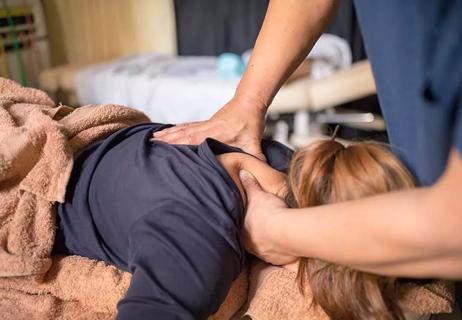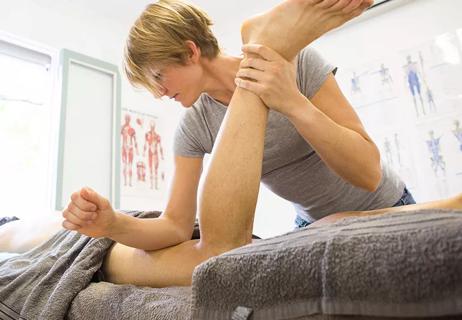This treatment may reduce stress, relieve pain and allergy symptoms, and help with sinus pressure

Many of us are familiar with the concept of acupuncture, a traditional Chinese medicine (TCM) method involving thin needles, which are inserted into various points on your body to treat or prevent illness. But what about acupressure?
Advertisement
Cleveland Clinic is a non-profit academic medical center. Advertising on our site helps support our mission. We do not endorse non-Cleveland Clinic products or services. Policy
While acupressure targets similar spots on your body, it doesn’t involve needles. Rather, acupressure is a type of massage that you can do on your own — and you may have already done so without realizing it!
Both acupuncture and acupressure rely on stimulating hundreds of “acupoints” along what’s known in TCM as your body’s 14 meridians or energy-carrying channels. The theory is that these points can be targeted to help relieve stress and anxiety, allergies, nausea and more.
“Acupuncture is more effective and long-lasting,” clarifies licensed acupuncturist Megan Scott, LAC. “However, I often teach people acupressure to help them self-treat at home between appointments. Different symptoms may be relieved by placing pressure on different areas of your body. It’s safe, easy and effective.”
Scott breaks down the different kinds of pressure points for us and explains how to use them to find relief.
There’s still much to understand about how acupuncture and acupressure work, but there’s also good scientific evidence that these ancient techniques do work.
According to TCM, your body has a series of meridians, which you can think of as invisible highways. The theory is that energy, also called “Qi” (pronounced “chee”), flows along these highways. And when they get blocked, it can be like a traffic jam.
Advertisement
The idea behind acupressure is that pressing on these “acupoints” can help clear the traffic jam, letting your energy flow smoothly again.
Scott says that the most common way to administer acupressure is using your fingers, especially your thumbs. “You’re just using your fingers to apply steady pressure into a selected point,” she explains.
Acupressure is used both to soothe physical symptoms and to calm the mind. While research on the effectiveness of acupressure is still ongoing, Scott highlights how this practice (if done safely) can be beneficial for your health.
“It makes people feel like they are taking control of their own health. It feels good to know that you’re doing something that will ease your symptoms,” she notes.
Acupressure can be used to relieve symptoms from:
Overall, Scott says that acupressure will have the most success when used alongside other treatments.
Acupressure involves different techniques to apply pressure to specific points on your body. Here are some common techniques and essential pressure points you can try.
L120, or “Lower Intestine 20,” is an acupoint located at the sides of your nose — or the small indentation where the nose meets the cheek. Scott highlights that this point can be useful for clearing nasal congestion and reducing sinus pressure. You may also relieve facial pain or swelling by pressing down on this point.
How to apply:
If you’ve ever stared at a computer screen for too long, you may feel the urge to rub your temples due to eye strain. The UB2 pressure point, or “Urinary Bladder 2,” is a step above that. UB2 is a pressure point located at the inner corners of the eyebrows, right above your eye socket, in the slight indentation at the edge of your eyebrow.
This point is commonly used to soothe tension headaches, especially those originating near your forehead or behind your eyes.
Advertisement
How to apply:
Scott notes that you should avoid pressing too hard, as this area around your eyes is sensitive.
This point is in the center of your forehead, between your eyebrows, also known as “Pressure Point Extra – 1.” Applying gentle pressure to this area can also help relieve congestion or help with slight headaches.
How to apply:
Ren 17, also known as “Conception Vessel 17,” is in the middle of your chest, at the level of your nipples, right on your breastbone (sternum). This point is used for calming emotions, relieving stress and reducing anxiety.
How to apply:
Advertisement
PC6, also known as “Pericardium 6,” is a pressure point on the inner part of your wrist. Specifically, it’s about three finger-widths below the base of your palm. This spot is also used to help calm anxiety.
How to apply:
“Fun fact, this one can also be great for nausea, motion sickness and morning sickness,” shares Scott. “Especially since sometimes, stress and anxiety can lead to feelings of nausea.”
Another great point you can try is Stomach 36. This point is about four finger-widths below your kneecap and one finger-width to the outside of your shinbone (tibia). Scott says that this area is used to help with digestion, nausea and constipation. It may help relieve congestion, too.
How to apply:
Advertisement
When stress affects your sleep, Scott recommends grounding yourself with Kidney 1, located on your sole, just under the ball of your foot. “You can provide a calming acupressure passage for your partner or loved one,” she says. Scott adds that you can also massage that point by bending over or doing a hip-opening pose.
How to apply:
Scott says that many of these acupressure techniques can also be combined to enhance their effects.
For example, you can combine the Yin Tang (forehead) and Ren 17 (sternum) pressure points for a more comprehensive approach to relieving anxiety and stress. If you’re trying to tackle your sinus troubles from all angles, you can stimulate LI20 (nose) to clear nasal passages and UB2 (edge of eye) to relieve the pressure around your forehead and eyes.
“Everybody can benefit from these points,” she enthuses.
It’s one thing to read about where the pressure points are, but it’s a whole different story when a professional shows you. So, if you’re not sure where to start, talk to a licensed acupuncturist first so you can learn the ropes.
Acupressure can be like a “recipe,” where stimulating a combination of points can be most effective. “All of those points are pretty accessible by anyone and don’t have too many risks,” reassures Scott.
At the same time, you should never feel worse after using acupressure on yourself. If you do, discontinue the practice and talk to a licensed professional before trying again.
“You should never press so hard that you would bruise yourself,” Scott warns. “You may notice a mild ache, which can help you find that point, but you should never hold pressure to the point of discomfort or pain.”
Acupressure can be a safe and complementary way to try and find relief from certain symptoms. When doing this practice, just make sure you’re listening to the sensations in your body and not causing any pain. And don’t hesitate to talk to a certified acupuncturist or traditional Chinese medicine provider to learn more about how to find the right acupoints for you.
“We can give you the support and guidance on how to do acupressure that has been specifically chosen for you,” reassures Scott.
Learn more about our editorial process.
Advertisement

Medical massage is tailored to your health needs to help you recover

By focusing directly on your pain points, you may find short- and long-term relief with this type of massage

The same things you do to treat sore muscles after exercise can help treat soreness after a massage

Focused on stretching and yoga poses, it can increase flexibility and ease back pain

These percussive devices can help relax muscles when seeing a masseuse isn’t an option

A whole-body practice that undoes the effects of gravity and repetitive motions

A massage can release stress, soothe muscles and alleviate pain

Wearing a scarf, adjusting your outdoor activities and following your asthma treatment plan can help limit breathing problems

Your diet in the weeks, days and hours ahead of your race can power you to the finish line

When someone guilt trips you, they’re using emotionally manipulative behavior to try to get you to act a certain way